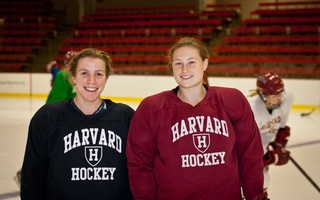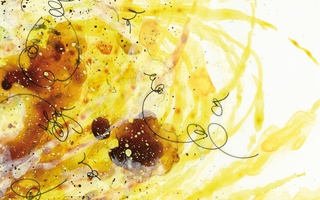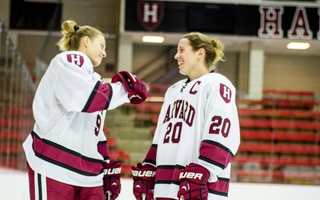{shortcode-baac9fd0561836fb93d49562ebc030d535b249ea}
Ridder Arena, the site of the 2015 women’s NCAA Frozen Four, is not a building accustomed to silence.
Over the last 10 years, the Minneapolis stadium has hosted three Frozen Fours and eight WCHA conference championships. Screaming crowds are as much a part of the architecture as the maroon-colored bleachers or the four-sided jumbo screen that hangs above center ice.
But on Thursday afternoon, when Harvard skaters took the ice for a tune-up in preparation for Friday’s national semifinal against Boston College, Ridder was an empty and desolate space. Whistles echoed; pucks echoed.
The quietness was really just a form of anticipation, a reminder of the chaos that glooms over the not-so-distant future. Tomorrow night, the Crimson will encounter either exhaustion or exhilaration, and the encounter will not take place in silence.
“It’s definitely a source of energy,” junior defender Michelle Picard said. “But within the rink, it’s the same game. We know what we’re here to do—just take a deep breath and play our game.”
Still, sitting in vacant rows, watching Crimson players joke around on an empty ice rink—it all makes you wonder whether Harvard, or any young team for that matter, can handle the transition from quiet privacy to loud and sudden publicity.
For three Crimson players and one coach, however, this doubt has already been answered. It’s inaccurate to characterize the upcoming tangle with the Eagles as the most significant contest of their careers because that milestone came and went just over a year ago.
On Feb. 20 of last year, the United States National Team suited up for a gold-medal final against Canada, and Harvard’s crimson-and-white was well represented among the red-white-and-blue. Not only did Crimson coach Katey Stone head the American squad, but she was also joined by senior defender Josephine Pucci, Picard, and senior forward Lyndsey Fry.
“I definitely learned a lot,” Picard said. “I got to play some big games on a big stage. This [semifinal] is another big game on another big stage.”
The game ended with heartbreak in the form of a 3-2 overtime loss, but a year removed from the event, Harvard players cite the Winter Olympics as a meaningful source of exposure to high-stakes hockey.
“As far as big games are concerned, you kind of get used to it,” Fry said. “Having that experience takes the nerves away a little bit.”
The setting alone substantiates the claim. In the National Team’s final Olympic match, the squad played beneath the Bolshoy Ice Dome in Sochi, Russia, which seats 12,000; nearly five million other viewers tuned in on NBC. By comparison, the Ridder Arena has capacity for 3,400 fans.
BC is not a stranger to Olympic experience, as junior forward Alex Carpenter made the trip to Sochi as well. At the games, she recorded four goals and an assist, which ranked her as the eighth-highest scorer in the world for the competition.
Eagles coach Katie King Crowley boasts an even more impressive Olympic resume. Crowley holds the all-time Olympic scoring record for the National Team; she compiled this total over three different Games. In all international play, she finished with 265 points.
However, Crowley has not led an Olympic side into battle as a coach. Stone has, which gives her a store of firsthand anecdotes to draw from.
“Fear can be paralyzing,” Stone said. “We’re going to do our best to try to limit distractions so that our kids can be at their best when their best is needed. Certainly, it’s a big stage for all the athletes involved in thus tournament, [and] it should be exciting.”
Of course, the Crimson roster includes more than three players and a coach. There are nearly two dozen skaters without Olympic experience on Harvard, which causes the question of pressure to resurface.
Again, Crimson team members respond by citing past performances. Even if Harvard players have not participated in an international tournament on the scale of the Sochi Olympics, they have played in other serious matches—prep school championships, state championships, age-specific national team games, and the like.
“All of our kids have had those experiences in different ways,” Stone said. “Players coming into all of our programs are pretty seasoned, and they are winners.”
In the 2014-15 campaign alone, the Crimson has played in enough elimination games to give a foretaste of the intensity of the Frozen Four.
In mid-February, Harvard defeated BC for the Beanpot title. Two weeks ago, the Crimson again pulled out an elimination game victory, this one over Cornell, to claim the ECAC championship. In both games, freshman forward Karly Heffernan scored a goal, and other young players contributed key minutes.
“Our freshmen aren’t playing like freshmen,” senior forward Samantha Reber said. “They go out there like they’ve been here for years, which makes everyone really fun to play with.”
Olympic experience or not, playoff experience or not, all past storylines should fall away as soon as Friday’s match gets underway. That’s the beauty of playoff hockey—nothing matters except for the 60 minutes on the ice.
“I’ve never been in the Frozen Four, so I’m just trying to take it one game at a time,” Picard said. “I’m excited to play with this team…. What happened a year ago doesn’t mean anything for tomorrow.”
—Staff writer Sam Danello can be reached at sdanello@college.harvard.edu.
Read more in Sports
Internal Crimson Analytics Recognize Moundou-Missi as Best Crimson PlayerRecommended Articles
-
Move Them to SwitzerlandA S THE SMOG of international political idiocy descends upon the Los Angeles Olympics, cries have arisen that it's time
-
 Crimson Skaters Will Take to the Ice in Sochi
Crimson Skaters Will Take to the Ice in Sochi -
Four Inspiring U.S. Olympic Victories in SochiHopefully these will be a source of inspiration—if these athletes can succeed against all odds, then you should be able to get that 10-page paper in by midnight tonight, right?
-
 Jonny Greenwood And Bryce Dessner Shine On Classical Split LP
Jonny Greenwood And Bryce Dessner Shine On Classical Split LP -
 Back at Bright: Olympians Return to Home Ice
Back at Bright: Olympians Return to Home Ice -
Harvard Should Rethink Being Boston Olympic Bid BoosterWhile we encourage and commend Harvard’s substantial involvement in civic and community endeavors, we feel in this case that the Olympic bid is the wrong one to support.













